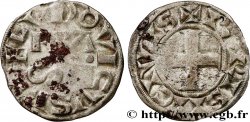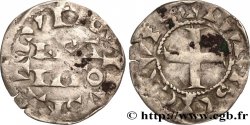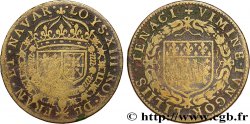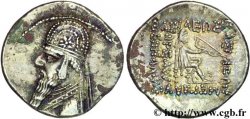正面
正面的文字 + LVDOVICVS [RE].
正面的说明书 Buste couronné de Louis VII, de face.
正面的翻译 (Louis, roi).
背面
背面的文字 + ROGERVS EPC.
背面的说明书 Buste mitré de Roger de Rosoi.
背面的翻译 (Roger, évêque).
历史细节
LOUIS VII THE YOUNG
(01/08/1137-18/09/1180)
The reign of Louis VII began under the best auspices. Crowned since 1131, Duke of Aquitaine by his marriage, the king enjoyed a most favorable internal and external situation, the civil war raging in England and in the Empire. The abbot of Saint-Denis, Suger, continued to act as the first adviser to the monarch, as he had been to his father.. The first years, however, were wasted in a sterile war against the Count of Champagne and in a long and tangled conflict with the pope for the appointment to the archiepiscopal see of Bourges.. In 1145, the king took the initiative of a second crusade, which was approved by Pope Eugene III and preached by Bernard of Clairvaux, founder of the Cistercian order.. Louis VII took his great vassals with him, effectively leaving the regency to the Abbot of Saint-Denis. At the invitation of Saint Bernard, Emperor Conrad III in turn crossed. The Christian army took the land route in 1147, crossed the Byzantine Empire and reached Antioch in 1148. The operations against the Muslims in Asia Minor and Syria were a complete disaster.. The king returned to France the following year. Despite this failure, the second crusade bears witness to the prestige and new power of the King of France in the 12th century.. While the crusade of 1095, a sign of the first revival of the West, had been the work of the Church and the feudal lords, Philip I remaining completely foreign to it, that of 1147 had had the king of France as its leader, equality with the emperor. For the first time, a French sovereign had been able to train an army outside Europe and his operations had taken place without the monarchy feeling any damage.. After the death of Suger, which occurred in 1151, the reign of his master, deprived of an excellent adviser, took a much less favorable course.. In 1152, Louis VII divorced Aliénor, who had not given him a male heir, thus losing Aquitaine. Two months later, the deposed queen married Henri Plantagenêt, count of Anjou and duke of Normandy, who went to war against the king of France. In 1154, on the death of Etienne de Blois, Henry became king of England: the vassal had become more powerful than the suzerain.. In the years that followed, the Angevin seized Brittany, subjugated Scotland, snatched the Vexin from the King of France.. From 1173, the war resumed even more fiercely between Henry II and Louis VII, the king favoring the revolt of the sons of his vassal. But Henry soon got his impatient sons right and the Angevin empire was able to continue to grow. The danger also came from the Empire and the ambitions of Frederick Barbarossa, elected emperor in 1151 and who wanted to subjugate Italy and the kingdom of Arles.. Faced with this increase in power, all of eastern France risked falling under Germanic tutelage.. During the schism that occurred after the death of Pope Adrian IV in 1159, the king sided with Alexander III and the emperor with Victor IV.. In 1162, Alexander took refuge in France, where he remained until 1165: in 1163, he granted Louis the "golden rose", symbol of the justice and piety of this devout king and reward for his loyalty to the Holy See. Once again, it is by an intimate union with the Church that the French monarchy succeeds in prevailing over the encroachments of English and German rivals.. Throughout the kingdom, the clergy relayed royal power and its legitimacy.. Through this, Auvergne, Languedoc, Dauphiné gradually entered the Capetian orbit. In 1161, the Bishop of Mende came to Paris from distant Gévaudan to pay homage to King Louis. Inhabitants of cities and petty lords followed this example: thus were to be undermined the foundations of feudal principalities.. Within his domain, Louis VII had made Paris a veritable capital, completed the subjugation of the lords of Ile-de-France, granted many bourgeois charters and created many new towns.. In 1165, Adelaide of Champagne gave him a first son: the future Philippe Auguste. The young prince was crowned in 1179, a year before his father's death, and from then on began to reign effectively.








 对产品描述纠错
对产品描述纠错 打印
打印 分享我的选择
分享我的选择 提问
提问 Consign / sell
Consign / sell
 产品介绍
产品介绍










